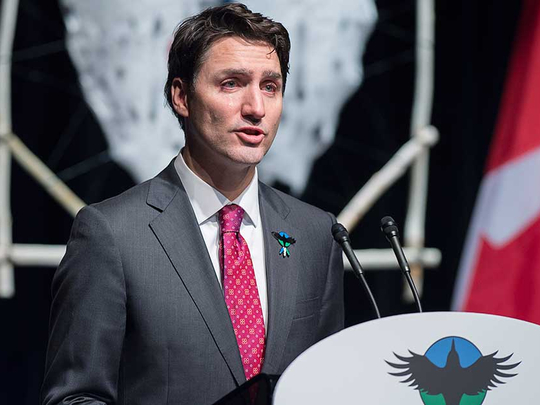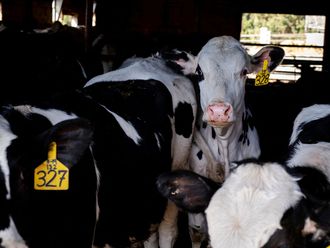
Ottawa, Ontario: Prime Minister Justin Trudeau offered a broad and emotional apology Friday to indigenous people in the province of Newfoundland and Labrador, where for much of the 20th century indigenous children were compelled to attend boarding schools that separated them from their families and cultures and, in many cases, subjected them to abuse.
In addition to the apology, the Canadian government settled a class-action lawsuit and will provide about 50 million Canadian dollars (Dh144 million) to about 900 former students of the five schools, which endured until 1980.
The decision came after a decadelong controversy over the federal government’s responsibility.
In 2008, Trudeau’s predecessor, Stephen Harper, apologised to indigenous people in the rest of Canada for a residential school programme the federal government operated from the 19th century until 1996. A national Truth and Reconciliation Commission later condemned that system as a form of “cultural genocide.”
Because Newfoundland and Labrador did not join Canada until 1949, its boarding school system had different origins even if it had a similar legacy. Harper’s government took the view that the abuses committed there in the early 20th century were not the federal government’s fault.
But in a ceremony in Happy Valley-Goose Bay, Newfoundland, at which victims also spoke, Trudeau said, “It’s time for Canada to acknowledge its history for what it is: flawed, imperfect and unfinished.”
“For far too many students, profound cultural loss led to poverty, family violence, substance abuse and community breakdown,” Trudeau said. “It led to mental and physical health issues that have impeded their happiness and that of their family. Far too many continue to face adversity today as a result of time spent in residential schools, and for that we are sorry.”
At the arts centre where Trudeau spoke, organisers had stacked boxes of facial tissues. They were put to use. Trudeau blotted his eyes and dabbed his nose with a handkerchief, and former students and others in the crowd sobbed.
Toby Obed, 45, a former student and one of the leaders of the class-action lawsuit, entered the stage after Trudeau in a jubilant mood, arms raised and shouting, “We did it.”
But Obed was overcome by emotion as well.
“We felt left out, forgotten and abandoned,” said Obed, who had testified about being a victim of sexual assault. “Because I come from a patient and forgiving culture, I think it is proper for us to accept an apology from the government of Canada.”
Not everyone in the region’s indigenous community was so forgiving.
Grand Chief Greg Rich of the Innu Nation, an umbrella organisation of indigenous groups, said in a statement that he wanted the apology to also recognise injustices suffered by aboriginal children in day schools, at an orphanage and in the child-welfare system.
“Our elders are not ready to accept an apology that is made for such a small part of our experience,” Rich said in his statement.
But Todd Russell, president of NunatuKavut, an organisation of Southern Inuit in Labrador, said he believed that the vast majority of former students welcomed the news.
“The apology was delivered in absolute sincerity and humility,” Russell, a former member of Parliament, said in an interview from Happy Valley-Goose Bay. “Today we were brought into the warmth of the cabin.”
The federal boarding school system for which Harper apologised in 2008 was one of several policies championed by Sir John A. Macdonald, Canada’s first prime minister, to assimilate indigenous people. While established and funded by the government, the operation of the schools was contracted out to several Christian religious denominations.
In contrast, the programme in Newfoundland and Labrador was much less systematic. Those schools and related dormitories were set up by Moravian missionaries or the International Grenfell Association, a Newfoundland charity established by Wilfred T. Grenfell, a British surgeon, missionary and explorer.
In an email, Keating Hagmann, chairman of the Grenfell Association, apologised for “not sheltering these individuals from the suffering they endured” and welcomed the government’s apology. The charity, which brought schooling and health care to remote Newfoundland communities aboriginal or otherwise, was largely out of the indigenous schools by the 1970s.
The Moravian Mission in North America did not respond to requests for comment.
The Truth and Reconciliation Commission that came out of Harper’s 2008 apology looked not only at the legacy of residential schools but also at overall relations between Canada and its indigenous people.
It produced a long list of recommendations that Trudeau has largely pledged to fulfil, although some members of the indigenous community say it has taken too long to act.












